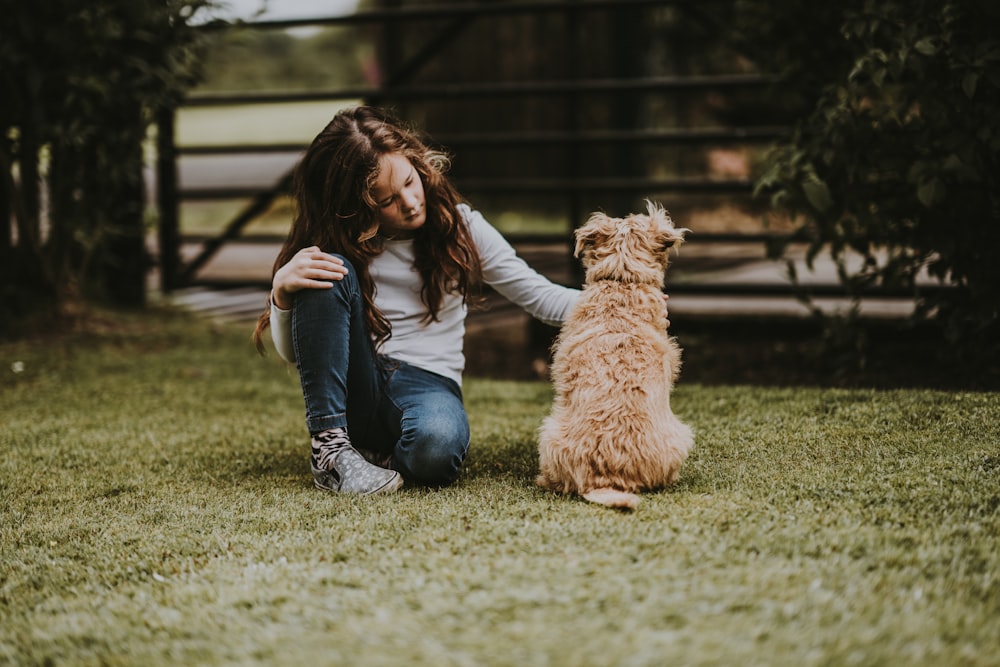Your dog is more than simply your pet, it is an important member of the family, and much like the rest of your family, you want them to live a happy and healthy life. This applies when they are awake as well as when they are sleeping!
On more than one occasion, you may have seen your dog twitching or crying in its sleep, which may cause you to wonder whether dogs can experience night terrors.
Dogs can suffer from nigh terrors. It is a known fact that dogs dream and, while we would like to think that their dreams are made up of oversized chew bones and chasing squirrels, there are times when dogs are seen growling, screaming, or even showing aggressive behavior during their sleep.
In this article, we’ll discuss why dogs suffer from night terrors and if there is anything that can be done to combat these sometimes alarming occurrences.
What Causes Night Terrors in Dogs?
Identifying the root cause of your dog’s night terrors can significantly help you reduce your pets’ exposure to the types of situations that are causing the problem.
The cause of your canine’s night terrors can be something as simple as a television show or a harmless noise in the house that can affect your dog’s sleep. You might feel guilty if, for some reason, you struck them out of anger or frustration, but they’re unlikely to remember this for very long.
Dogs can also become anxious and start to have night terrors after being exposed to loud sounds, such as children playing or noisy visitors. We might find some comfort in believing that they have dreams and fears like us that play out in their sleep (source).
Should I Wake My Dog Up During a Night Terror?
It is generally wise to wake your dog up from a night terror as it can interrupt your dog from obtaining the correct amount of REM sleep. Even if your dog is having the symptoms of a night terror, interfering with their sleeping patterns can deprive them of the sleep that they need.
In addition to this, waking your dog up suddenly from a night terror can cause them to behave aggressively towards you before realizing what they are doing. The best thing to do for a dog you believe is having a bad dream is to wait for them to wake up and be there to comfort them (source).
How to Stop Your Dog’s Night Terrors
As a pet owner, it is hard not to instinctively run over to your pet and shake it awake from its night terror. While it’s best not to awaken your dog when it is experiencing a night terror, if you must, there are a few things that you can do to wake it up gently without startling it.
Softly Call Your Dog’s Name
If you elect to wake up your dog, this needs to be done carefully and safely. Call your dog’s name softly and, if your dog does not wake up, then it is then advisable to call its name several more times, each time increasing your volume slightly.
Do not lean down close to or touch your dog during its night terror; otherwise, you might startle it. This can cause your dog to lash out at you upon waking unknowingly.
Let the Nightmare Run Its Course
If you choose to let your dog continue sleeping, try to wait as quietly as possible until your dog wakes up.
Seeing your dog in the midst of a night terror can be quite distressing for you as a pet owner, but it is important to take heed that the night terror will not last forever. Bear in mind that dogs tend to forget about their night terrors soon after waking up.
Soothe Your Dog When It Wakes Up
Once your dog has awoken, from its night terror it may feel a little confused and disoriented. Put on some soothing music to help your dog calm down and relax but do not touch your dog right away. Wait until your dog seems more alert and calm before you get close to it.
Treating Your Dog for Night Terrors
If your dog is experiencing regular night terrors, you may want to take a look at its current living situation to decipher whether or not it is stable and follows a predictable routine. These routines are what allows your dog to feel secure and unstressed.
The Holistic Approach
It is important to fill your dog’s day with happy experiences and pleasant memories. Your dog’s dreams are normally about what it has experienced during the day, so it is good practice to try and keep your dog happy during the day and limit its bad moments to minimize night terrors.
Here are some tips to help ensure that your dog enjoys good days:
- Play games with your dog.
- Take your dog on long walks.
- Spend some quality quiet time with your dog, especially before bedtime.
- Turn on soft relaxing music before bedtime as well as while your dog sleeps.

The Pharmaceutical Way
Sometimes, the holistic methods may not work for your dog. In this case, certain medications may need to be prescribed.
A DAP Collar
The DAP acronym stands for “dog appeasing pheromone.” Pheromones can be described as something that dogs use to communicate with each other. When a DAP collar releases this chemical, it can relax your dog and curb night terrors.
Anti-Anxiety Medication
In some cases, your canine may need prescription medication from a professional, especially if the night terrors are becoming a regular occurrence.
Bear in mind that this should be a last resort as dogs, much like humans, can become reliant on these medications. The AKC notes that SSRIs (Selective Serotonin Reuptake Inhibitors) and antidepressants may be prescribed for dogs with anxiety.
Taking Your Dog to See a Behavioral Therapist
If you believe that your dog’s night terrors could be putting yourself or others in a compromising situation, it is advisable to consult with a professional to determine the best course of action.
The first step would be to speak to your veterinarian to find out if there is perhaps an underlying issue that may need to be treated. Thereafter your vet may refer you to a certified pet behavioral professional to ascertain how they can work together with you to rectify the problem.
Treatment could include group sessions, private classes, day training, or “board-and-train” arrangements, depending on your circumstances and your pet’s needs (source).
Final Thoughts
Nobody wants their furry friend to suffer from night terrors, and as loving dog owners, we owe it to them to ensure we get to the root of the problem, treat it, and make sure that it does not occur regularly.
Although nothing is foolproof when it comes to preventing night terrors in dogs, we can still do our utmost to prevent them. If we find that, on some occasions, we are unable to prevent them, then practicing endless love and affection can help the aftereffects of night terrors and enable them to be easily forgotten by our beloved pets.



0 Comments